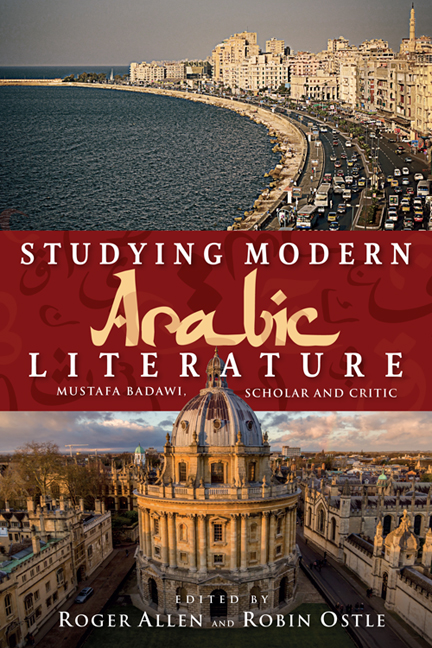Book contents
- Frontmatter
- Contents
- List of Figures
- Introduction
- Part I Alexandria to Oxford
- Part II The Academic Legacy
- 5 Beginning and End: Exploring the Qur'anic ‘Grand Story’
- 6 Modern Arabic Literature as Seen in the Late Nineteenth Century: Jurji Murqus's Contribution to Korsh and Kirpichnikov's Vseobshchaya Istoria Literatury
- 7 The ‘Second Journey’ (Al-Rihla al-thaniya) of Muhammad al-Muwaylihi's Hadith 'Isa Ibn Hisham Revisited
- 8 Ataturk Becomes 'Antar: Nationalist-vernacular Politics and Epic Heroism in 1920s Egypt
- 9 Jewish Arabs in the Israeli Asylum: A Literary Reflection
- 10 Strange Incidents from History: Youssef Rakha and his Sultan's Seal
- 11 Towards a Comparative Approach to Arabic Literature
- 12 Does Literature Matter? The Relationship between Literature and Politics in Revolutionary Egypt
- Notes on the Contributors
- Index
5 - Beginning and End: Exploring the Qur'anic ‘Grand Story’
from Part II - The Academic Legacy
Published online by Cambridge University Press: 05 August 2016
- Frontmatter
- Contents
- List of Figures
- Introduction
- Part I Alexandria to Oxford
- Part II The Academic Legacy
- 5 Beginning and End: Exploring the Qur'anic ‘Grand Story’
- 6 Modern Arabic Literature as Seen in the Late Nineteenth Century: Jurji Murqus's Contribution to Korsh and Kirpichnikov's Vseobshchaya Istoria Literatury
- 7 The ‘Second Journey’ (Al-Rihla al-thaniya) of Muhammad al-Muwaylihi's Hadith 'Isa Ibn Hisham Revisited
- 8 Ataturk Becomes 'Antar: Nationalist-vernacular Politics and Epic Heroism in 1920s Egypt
- 9 Jewish Arabs in the Israeli Asylum: A Literary Reflection
- 10 Strange Incidents from History: Youssef Rakha and his Sultan's Seal
- 11 Towards a Comparative Approach to Arabic Literature
- 12 Does Literature Matter? The Relationship between Literature and Politics in Revolutionary Egypt
- Notes on the Contributors
- Index
Summary
Scholars have spoken about different dimensions of religion, one of which is that of myth or narrative. Though religions are usually treated primarily as belief-systems, it may be argued that the narrative dimension is the basic and overarching element that defines the system, holds it together and gives it its ultimate meaning. Religion has always had to contend with the big and perennial questions of beginnings and ends and ultimate meanings. In contrast to philosophy (and science), religion has tended to address these issues through the device of myths and narratives.
This narrative element operates in the Qur'an on several levels: beginnings, biblical past, non-biblical past, present and eschatological future. The totality of these levels constitutes what may be described as the Qur'anic ‘grand story’. By ‘grand story’ I refer to the underlying, basic conceptual scheme that informs Qur'anic stories and bestows meaning and coherence on them. This basic conceptual scheme is predicated on a relationship between humankind and God that leads to either salvation or damnation. In expressing this relationship, the Qur'anic narrative form turns God into a person with a dramatic presence and human attributes. The focus in this chapter will be on the beginnings as expressed by the creation story and on the eschatological future.
Some key elements of this grand story are succinctly summed up in 16: 112–13 which reads:
God has struck a similitude: a city that was secure, at rest, its provision coming to it easefully from every place, then it was unthankful for the blessings of God; so God let it taste the garment of hunger and of fear, for the things that they were working. There came indeed to them a Messenger from amongst them, but they cried him lies; so they were seized by the chastisement while they were evildoers.
At the centre of the story we come across the three dramatic elements of God, God's messenger and the people of the city. Furthermore, there is a cluster of three elements that are in operation: the ingratitude (kufr) of the people of the city, the message of the messenger and the chastisement ('adhab) sent by God.
- Type
- Chapter
- Information
- Studying Modern Arabic LiteratureMustafa Badawi, Scholar and Critic, pp. 69 - 82Publisher: Edinburgh University PressPrint publication year: 2015



